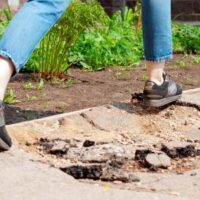How Open and Obvious Conditions Affect Your Fall Case

You may already know that in any kind of accident, one defense that the other side can and does use, is that you contributed to your accident or injuries, in full or in part. One way they do this, in terms of an accident where you fall, is to say that you didn’t see a dangerous condition, that was easily observable if you had looked.
The Open and Obvious Doctrine
The name for this defense is called open and obvious. As the name suggests, an open and obvious condition is something that is not hidden, not camouflaged, and which is clear to anybody who looks at it. Because it is so obvious, the law allows a defendant to point the finger at you, and say that you could have and should have seen and avoided such an obvious condition.
In fact, the open and obvious doctrine is so powerful that it can, in some cases, prevent you from recovering any damages at all for your fall.
Not a Complete Bar to Recovery
The good news is that many courts have transitioned from saying victims can never recover damages for falling over an open and obvious condition, to allowing a jury to consider how open and obvious the condition was—in other words, your compensation may be reduced if you fall over an open and obvious condition, but you won’t be barred from recovering compensation at all.
Duty to Fix, Not to Warn
A landowner doesn’t have to warn you of an open and obvious condition, such as by putting a sign up, or cordoning off an open and obvious condition. It does have a duty to repair an open and obvious condition that needs repair.
So, for example, if you just tripped over an obvious curb, you may not be able to recover compensation for your injuries—the curb is in the open, and the curb is not a “damaged condition” or anything that needs repair.
On the other hand, if you fell on chocolate ice cream on a white floor, the store would still have an obligation to “fix” (clean up) the condition, regardless of the fact it had no duty to warn you that the ice cream was on the floor. It could certainly still argue that you could have and should have seen the spill—but that would not automatically mean that you can’t recover any damages for your fall or for the injury.
New Comparative Fault Laws
One problem that comes from cases involving open and obvious conditions, is the new comparative fault law in Florida. If a jury finds you more than 50% responsible for your own accident, you can’t recover anything-open and obvious condition or not.
Because of this new law, which gives careless defendants an avenue to get away with not compensating victims, the open and obvious defense is one that many defendants are going to try to use, a lot more frequently than they may have done, previous to the law change.
Contact the Tampa personal injury lawyers at Barbas, Nunez, Sanders, Butler & Hovsepian and schedule a consultation today if you fell in a store or on someone’s property.
Sources:
findlaw.com/injury/torts-and-personal-injuries/what-is-the-open-and-obvious-defense.html
law.cornell.edu/wex/comparative_negligence#:~:text=Comparative%20negligence%20is%20a%20tort,party%20contributed%20to%20the%20incident




